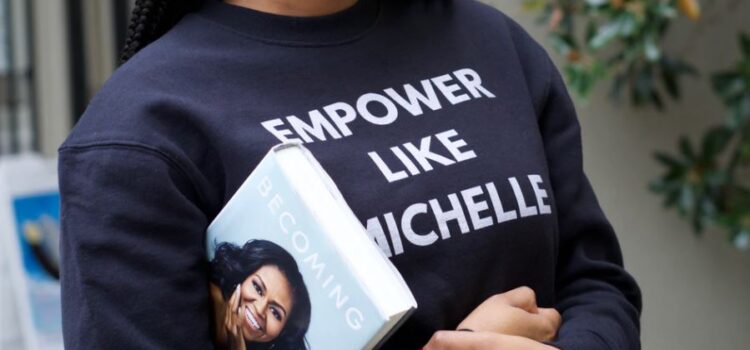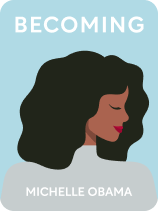

This article is an excerpt from the Shortform book guide to "Becoming" by Michelle Obama. Shortform has the world's best summaries and analyses of books you should be reading.
Like this article? Sign up for a free trial here .
Are you going to be discussing Michelle Obama’s memoir Becoming in your next book club meeting? Are you looking for discussion questions about the book?
Michelle Obama’s memoir Becoming is a reflection on Michelle’s life and how she came to be the first lady. Through ambition and hard work, she excelled in Ivy League universities and throughout her career.
Keep reading for Becoming book club questions to discuss.
Becoming Book Club Questions
Michelle Obama’s memoir Becoming delivers candid reflections on the life of the first African-American first lady. Offering a window into her personal evolution, Michelle details how ambition, hard work, and embracing her authentic story helped her journey from her family’s Chicago working-class neighborhood to a 47th-floor law office, then to the White House and beyond. Below are Becoming Michelle Obama book club questions to discuss:
Who Were Your Doubters?
When Michelle told her high school counselor she’d like to apply to Princeton, the counselor told her she “wasn’t Princeton material.” But Michelle ignored her advice and got into Princeton anyway.
- Think of a time when you voiced your ambitions, and someone responded by doubting you. Who was it, and what did they say?
- What impact did their words have on you? Did you go ahead with your plans anyway or change them?
- List three reasons why that person was wrong about you.
How Did Your Hometown Shape You?
Michelle’s South Shore neighborhood shaped her in a profound way. As she says, where we come from has a strong effect on the person we become—it’s a major contributor to our character.
- Describe the neighborhood or region you grew up in. List two advantages and two disadvantages of growing up there.
- Considering your answers to the question above, how did that environment shape who you are today?
Knowing When to Swerve
Michelle Obama writes about being a “box checker” as a child, someone who strives for perfect attendance and straight A’s. She followed a straight-line path to success, checking off one box after another until she reached her academic and career goals. But later in life, she learned she had to “swerve” to adjust to life’s circumstances. (For example, she veered away from corporate law to a more meaningful but lesser paying job.)
- In general, do you see yourself as someone who checks boxes or someone who swerves? (To think of it another way: Do you see yourself as a meticulous planner or as someone who is more spontaneous in your decision-making?) What makes you say this?
- Give an example of a time that your approach—either box-checking or swerving—worked well for you.
- Have you ever blindly worked so hard toward achieving something that you didn’t realize you were on the wrong path? How did you realize it and what did you do then?
- Have you ever veered off your predetermined life plan when you’ve wanted or needed to? If so, describe your swerve and its outcome—whether or not it worked out well.
Supporting Your Partner When You Don’t Agree
Michelle decided to support Barack’s run for the Presidency despite her deep misgivings about politics and her longing for a private family life.
- How do you resolve career conflicts—or other major conflicts of interest—in your relationship?
- Describe an instance in your relationship where you made a big concession. How did it turn out for you?
- How did it turn out for your partner? Did your concession give them something of value that they needed or wanted?
- Would you make the same decision again? Why or why not?
The Importance of Mentors
Michelle described a number of women who served as mentors for her at different times in her life—from her boss at her work-study job at Princeton to her colleagues at Chicago City Hall to past first ladies in the White House. Each mentor helped her to see what kind of person she could become.
- Name three of the most important mentors in your life. Next to each name, write what they’ve helped you to achieve.
- Think of an important goal in your life. Name that goal, and then name a few people who might be able to serve as mentors to help you achieve it. (If you don’t know of anyone, consider places where you might look for a mentor.)
- Think of someone that you could mentor right now—someone who is trying to learn something you already know, or enter an industry or community that you’re already familiar with. Name that person and what you might be able to offer him or her.
The Importance of Friendship
This Becoming book club question focuses on friendship. When Michelle moved to Washington, D.C., she had to work harder to maintain her relationships with her Chicago girlfriends. But because these friends had always been her “circle of strength,” she made an extra effort to keep them close (for example, planning getaways at Camp David with them).
- List three people who are part of your circle of strength. Next to each name, write how that person supports you.
- How often do you communicate or spend face-to-face time with these three people? Name three ways you could increase that time.

———End of Preview———
Like what you just read? Read the rest of the world's best book summary and analysis of Michelle Obama's "Becoming" at Shortform .
Here's what you'll find in our full Becoming summary :
- How Michelle Obama went from the South Side of Chicago to the White House
- Why much of her success came from her being determined from a young age
- How Michelle Obama continues to push herself and discover new opportunities






